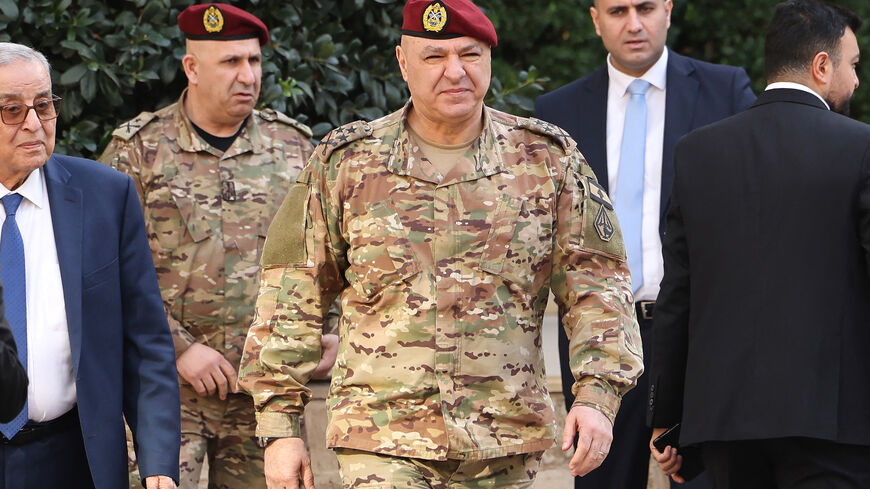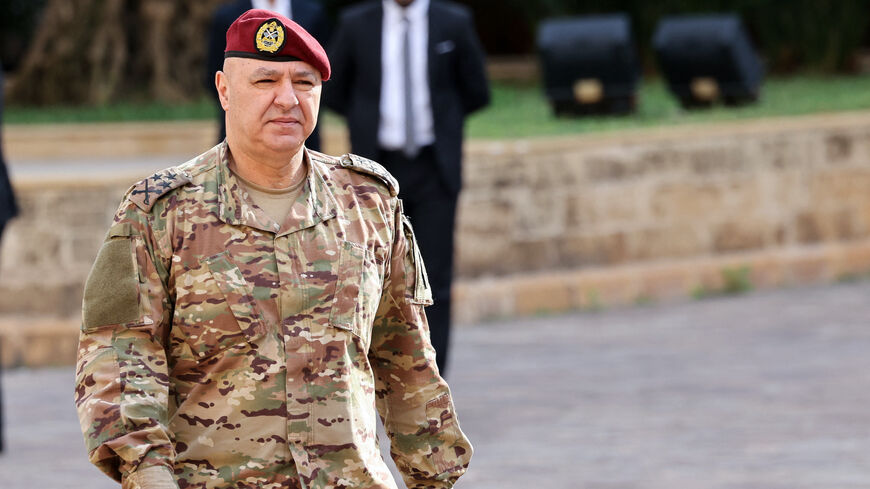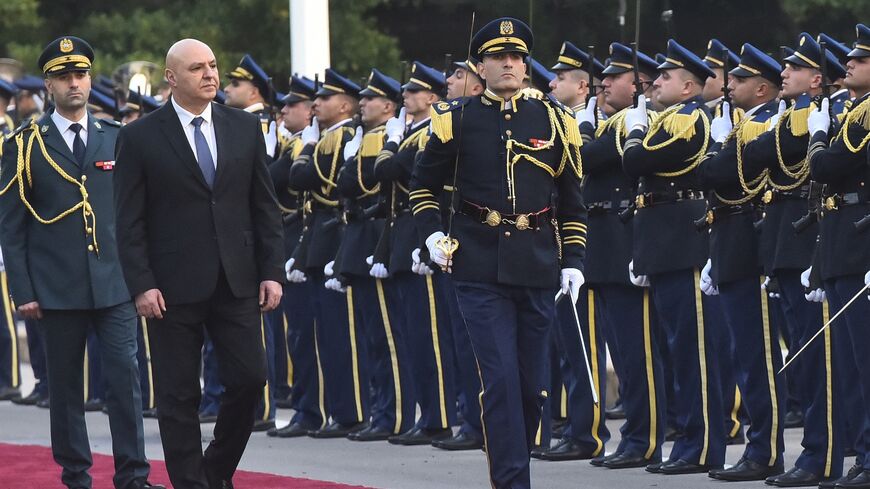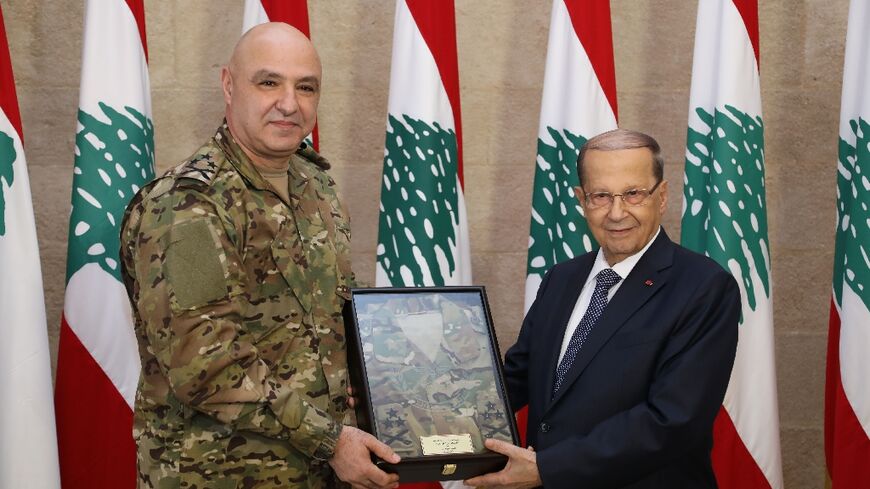US envoy Hochstein in Lebanon as Israel ceasefire teeters, election looms
Amos Hochstein's visit comes amid uncertainty over the ceasefire between Israel and Hezbollah as well as an upcoming presidential vote in Lebanon's parliament.

BEIRUT — US special envoy to the Middle East Amos Hochstein arrived in Beirut on Monday, following a stop in Saudi Arabia and ahead of political and security tipping points for Lebanon.
Hochstein’s visit comes at a critical time for Lebanon, where the deadline looms for a complete withdrawal of Israeli troops from the south as stipulated in the Israel-Hezbollah ceasefire agreement and a presidential vote is scheduled for Jan. 9.
The US envoy was a key negotiator in the agreement, which also includes Hezbollah moving north of the Litani River, about 30 kilometers (20 miles) from the border with Israel. The Lebanese army will also deploy in the south alongside UN peacekeeping forces to prevent Hezbollah from regrouping.
Good land back in #Beirut pic.twitter.com/OlmEj8kFJH
— amos hochstein (@amoshochstein) January 6, 2025
The ceasefire states, however, “These commitments do not preclude either Israel or Lebanon from exercising their inherent right of self-defense, consistent with international law.”
The ceasefire has grown increasingly fragile, with the Israeli air force conducting strikes on Hezbollah rocket launchers in southern Lebanon last Thursday. Hezbollah has also pushed the boundaries of the ceasefire, firing mortars at an Israeli army base on Dec. 2.
The local MTV station reported that during his Beirut visit, Hochstein will propose extending the ceasefire for an additional 60 days to implement its clauses, including the Israeli withdrawal from the south.
The withdrawal was set to be completed by Jan. 25, 60 days after the ceasefire went into effect and just days after US President-elect Donald Trump’s inauguration.
On Monday, a convoy of the Lebanese army and UNIFIL entered the southern town of Naqoura from al-Bayada following the withdrawal of the Israeli army, according to the local LBCI channel.
The Israeli military had begun withdrawing from several neighborhoods of Naqoura last week, but prevented the Lebanese army from deploying there.
الـLBCI توثق عملية دخول موكب للجيش اللبناني واليونيفيل من البياضة في اتجاه الناقورة وذلك بعد سلسلة محاولات سابقة للدخول من دون نجاح بسبب عدم توفر الإذن الإسرائيلي ويأتي ذلك بموازاة إجتماع اللجنة الخماسية في حضو آموس هوكستين والناقورة هي أول بلدة حدودية يعود إليها الجيش على الخط… pic.twitter.com/VTgB1F5PRo
— LBCI Lebanon News (@LBCI_NEWS) January 6, 2025
The movement in Naqoura coincides with a meeting of the committee supervising the implementation of the ceasefire agreement in Ras Naqoura, which Hochstein is attending.
Parliamentary vote on president expected this week
There has been increased diplomatic activity as regional and international actors are pressing ahead to resolve thorny issues in Lebanon, including the more than two-year vacuum in the presidency.
On Sunday, Hochstein met with Saudi Foreign Minister Prince Faisal bin Farhan bin Abdullah in Riyadh. They discussed the latest developments in Lebanon and the efforts underway to address them, according to a ministry statement that did not provide more details.
According to the ministry's readout, the meeting was attended by the adviser to the foreign minister on Lebanese affairs, Prince Yazid bin Mohammed bin Fahd Al Farhan.
Prince Yazid had paid a visit to Beirut on Saturday after Prince Faisal canceled his planned trip to the Lebanese capital later this week.
During his Beirut visit, the Saudi adviser held meetings with Lebanese officials including parliament speaker and Hezbollah ally Nabih Berri as well as party leaders like Samir Geagea, the head of the Lebanese Forces. According to local reports, his visit focused on the upcoming presidential elections in Lebanon.
Lebanese army chief Joseph Aoun also went to Saudi Arabia on Dec. 26 on the invitation of Saudi Chief of General Staff Fayyad al-Ruwaili. He met with Saudi Minister of Defense Prince Khalid bin Salman bin Abdulaziz, discussing military and defense relations between the two countries as well as ways to strengthen support for Lebanon’s military.
Last Monday, Aoun met in Beirut with visiting French Foreign Minister Jean-Noel Barrot and Defense Minister Sebastien Lecornu. The meeting focused on “ways to strengthen cooperation relations between the armies of the two countries and to continue support for the army in light of current circumstances,” an army statement said.
Lebanon has been without a head of state since the term of Hezbollah-backed President Michel Aoun’s term ended in October 2022. Lebanon’s fractured parliament has tried 12 times since then to elect a new president.
On Nov. 28, Berri called for a parliament session to elect a new president to be held Jan. 9. The announcement came one day after the US-brokered ceasefire began, ending more than a year of hostilities between the armed Hezbollah group and the Israeli army.
Now, with Hezbollah weakened, Lebanon’s chances of electing a president seem better.
The emerging front runner is the Lebanese army chief, Joseph Aoun, a member of Lebanon’s Maronite Christian community who has garnered respect across Lebanese political parties for his military leadership.
Another name being floated is Geagea, who led Lebanon’s Christian militias during the country’s civil war and is a vocal opponent of Hezbollah and Iran.
On Sunday, Hezbollah said it does not oppose Aoun’s candidacy. “Hezbollah does not veto Gen. Aoun’s candidacy for president,” Wafiq Safa, who heads the group’s liaison unit, said in a televised speech.
“Our only veto is against Samir Geagea, because he represents a project of sedition and destruction in the country,” he added.
Late last month, Aoun received an endorsement from Walid Jumblatt — a leader of Lebanon’s Druze and the former head of the Progressive Socialist Party — along with the Democratic Gathering bloc.
Yet other candidates remain, including Hezbollah-backed Suleiman Frangieh, who leads Lebanon’s Marda Party, previously an armed militia. Frangieh is also backed by Berri.
To win office, any of these potential candidates must secure a two-thirds majority in Lebanon’s 128-member parliament.







